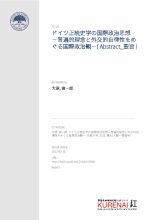10 0 0 0 OA ウィーン体制期国際秩序への普遍史的理解の深化 : 19世紀国際政治史における自由主義の影響
- 著者
- 大原 俊一郎
- 出版者
- 亜細亜大学法学研究所
- 雑誌
- 亜細亜法学 = Asia University Law Review (ISSN:03886611)
- 巻号頁・発行日
- vol.51, no.2, pp.352-333, 2017
4 0 0 0 OA ドイツ国際政治史学の歴史的文脈と思想 : 反覇権から秩序形成へ
- 著者
- 大原 俊一郎
- 出版者
- 亜細亜大学法学研究所
- 雑誌
- 亜細亜法学 = Asia University Law Review (ISSN:03886611)
- 巻号頁・発行日
- vol.50, no.2, pp.159-188, 2016
- 著者
- 大原 俊一郎
- 出版者
- 錦正社
- 雑誌
- 軍事史学 (ISSN:03868877)
- 巻号頁・発行日
- vol.51, no.1, pp.82-99, 2015-06
1 0 0 0 OA ドイツ正統史学の国際政治思想-普遍的理念と外交的自律性をめぐる国際政治観-
1 0 0 0 IR ドイツ正統史学の国際政治思想 : 普遍的理念と外交的自律性をめぐる国際政治観
- 著者
- 大原 俊一郎
- 出版者
- 一般財団法人 日本国際政治学会
- 雑誌
- 国際政治 (ISSN:04542215)
- 巻号頁・発行日
- vol.2017, no.189, pp.189_49-189_64, 2017-10-23 (Released:2018-12-19)
- 参考文献数
- 59
This paper argues that the German Historical School is the original main stream of thought in classical international political science in the West, and the methodology of this school makes research in international system through historical approach possible. In the 17th century, Gottfried Wilhelm von Leibniz and Samuel von Pufendorf discussed international political issues. Subsequently early 19th century, A.H.L Heeren initiated the research of international system through historical approach. The German Historical School has ever afterward been interested in the establishment of “system” in the European international order of the period between the 18th to the early 19th century, namely the maturity of the European “states system,” because it acknowledges that the European “states system” that mainly matured in the 18th century has formed the core of the world order up to the present.The first research field in the area of international system through historical approach is history of thought on international politics as “intellectual history.” In the 18th century, the theoretical evolutions of international law in the German-speaking countries, including studies by noted philosophers Christian Wolff and Emer de Vattel, and the intellectual evolutions in the French-speaking countries, including studies by the noted political theorist and philosophers Abbé de Saint-Pierre and Jean-Jacques Rousseau, formed the twin main streams of thought in this intellectual history. In addition, the intellectual evolutions in Britain included the studies of the noted philosopher. historian, and economist David Hume, which formed another stream of thought. They recognized and analyzed the formative process of “states system,” thereby influencing it.The second research field is investigation into the formative process of classical diplomacy called “diplomatic history.” In the middle of the 18th century, every great power reformed its own diplomacy, namely performing a “diplomatic revolution.” Then, in the second half of this century, international system of cooperation emerged as a multipolar system among great powers, preparing the way for the Concert of Europe beginning from Congress of Vienna in the early of the 19th century.The third research field is inquiry into the structural development of international system as “structural history”. The main subject of this “structural history” in the period between the 18th to the early 19th century is the transformation of the balance of power. The Machiavellian dynamic of balance of power of the early of the 18th century transformed the static and stable equilibrium in the second half of the 18th century. The above-mentioned intellectual and diplomatic evolutions contributed to this transformation for the European international order.In the maturing process of the European “states system,” thoughts and diplomacies transformed international structure through mutual interaction, resulting in the emergence of “system.” Therefore, the framework of the research of international system through historical approach is regulated by this formative process of “states system.” Every approach and research field relates to each other as the precondition of “states system.” Furthermore, the comprehension and the clarification of “states system” contributes to the understanding of the core function of the international system.
- 著者
- 大原 俊一郎
- 出版者
- 亜細亜大学法学研究所
- 雑誌
- 亜細亜法学 (ISSN:03886611)
- 巻号頁・発行日
- vol.51, no.2, pp.352-333, 2017-01
1 0 0 0 IR ドイツ国際政治史学の歴史的文脈と思想 : 反覇権から秩序形成へ (樋口直先生古希記念号)
- 著者
- 大原 俊一郎 Shunichiro Ohara
- 出版者
- 亜細亜大学法学研究所
- 雑誌
- 亜細亜法学 (ISSN:03886611)
- 巻号頁・発行日
- vol.50, no.2, pp.159-188, 2016-01
